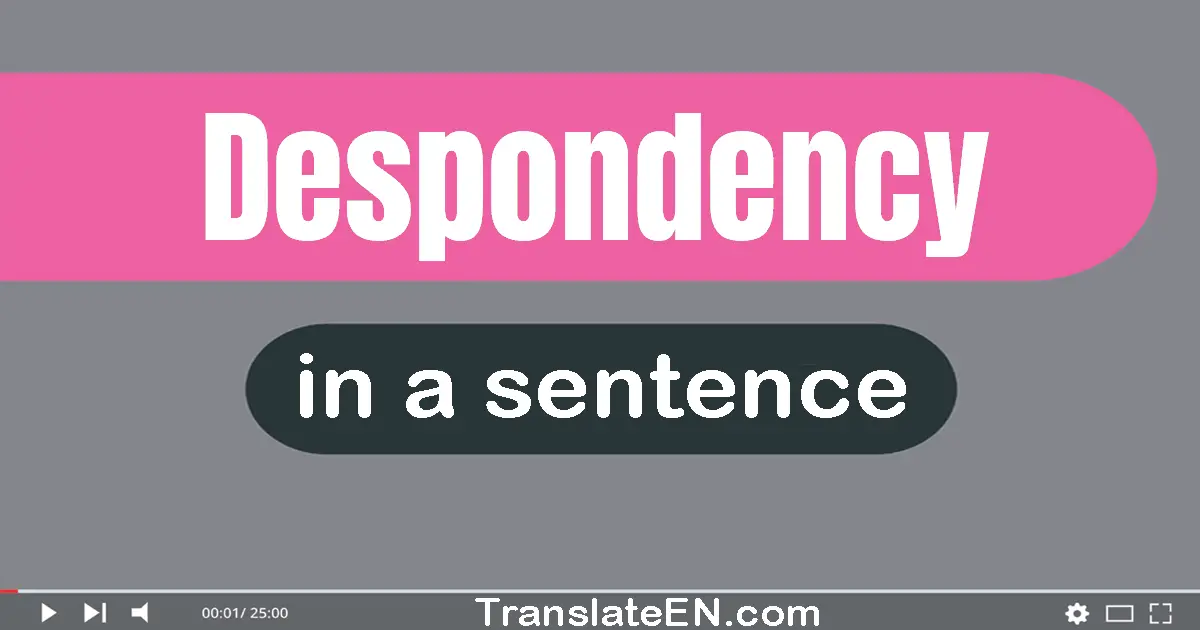Despondency in a sentence
Synonym: dejection, hopelessness. Antonym: optimism
Meaning: A feeling of deep sadness or hopelessness; a state of despair.

(1) Despite his despondency, he continued to work hard at his job.
(2) The despondency in his eyes mirrored the pain he felt deep inside.
(3) The overcast sky made the campus feel like a place of despondency.
(4) The despondency in her words revealed the depth of her disappointment.
(5) The array bleaknesses evokes a sense of despondency and disillusionment.
(6) Despite his despondency, he continued to volunteer at the local shelter.
(7) The feeling of despondency overwhelmed her as she faced yet another setback.
(8) She tried to find solace in her hobbies, but the despondency still lingered.
(9) She tried to hide her despondency behind a smile, but her eyes gave her away.
(10) The constant rain added to her despondency, making her feel even more gloomy.
Despondency sentence
(11) The despondency in her heart slowly faded as she found a new purpose in life.
(12) The despondency in the air was lifted as they celebrated their team's victory.
(13) He couldn't shake off the despondency that had settled over him after the loss.
(14) The despondency in the town was evident after the devastating natural disaster.
(15) The weight of despondency hung heavy in the air as they mourned their loved one.
(16) The despondency in his demeanor was a stark contrast to his usual cheerful self.
(17) The despondency in her soul was replaced with peace as she found inner strength.
(18) Despite his despondency, he knew he had to keep pushing forward and never give up.
(19) The despondency in her spirit was replaced with hope as she embraced a new beginning.
(20) The despondency in his voice was evident as he spoke about his failed business venture.
Despondency make sentence
(21) The despondency in her heart was replaced with forgiveness as she let go of past hurts.
(22) The despondency in the room was palpable as they discussed the dire state of the economy.
(23) The despondency in his voice was heartbreaking as he shared his struggles with addiction.
(24) The despondency in his face was replaced with a glimmer of hope as he received good news.
(25) The despondency in her voice was replaced with excitement as she shared her future plans.
(26) The despondency in his eyes was replaced with determination as he set new goals for himself.
(27) The despondency in the room was replaced with hope as they found a solution to their problem.
(28) The despondency in her eyes was replaced with a spark of joy as she received a surprise gift.
(29) The despondency in the room was shattered by a burst of laughter, bringing a moment of relief.
(30) The despondency in his soul was replaced with love as he found happiness in unexpected places.
(31) The despondency in his face was replaced with a smile as he realized he had overcome his fears.
(32) The despondency in his voice was replaced with determination as he vowed to turn his life around.
(33) The despondency in his demeanor slowly transformed into resilience as he faced adversity head-on.
(34) Despite her best efforts, she couldn't escape the cloud of despondency that followed her everywhere.
(35) Despite his despondency, he knew he had to keep fighting for his dreams and never give up on his goals.
Despondency meaning
Despondency is a noun that refers to a state of low spirits caused by loss of hope or courage. It is a feeling of extreme sadness or despair that can be caused by various factors such as failure, disappointment, or loss. Despondency is a common emotion that everyone experiences at some point in their lives. However, it is important to learn how to cope with it and overcome it. Here are some tips on how to use the word despondency in a sentence:
1. Use it in a sentence that describes a person's emotional state: "After losing his job, John fell into a state of despondency and stopped leaving the house."
2. Use it in a sentence that describes a situation: "The despondency in the room was palpable after the team lost the championship game."
3. Use it in a sentence that describes a character's personality: "Despite her despondency, Jane always tried to remain optimistic and find the silver lining in every situation."
4. Use it in a sentence that describes a book or movie: "The novel was a poignant portrayal of the despondency that can come with unrequited love."
5. Use it in a sentence that describes a historical event: "The Great Depression was a time of widespread despondency and economic hardship."
6. Use it in a sentence that describes a medical condition: "The patient's despondency was a symptom of their depression."
7. Use it in a sentence that describes a solution to despondency: "Talking to a therapist can help alleviate feelings of despondency and provide a path towards healing."
In conclusion, despondency is a powerful emotion that can be difficult to overcome. However, by using the word despondency in a sentence, we can better understand and express this feeling. Whether it is describing a person's emotional state, a situation, or a solution, using the word despondency can help us communicate our thoughts and feelings more effectively.
The word usage examples above have been gathered from various sources to reflect current and historical usage of the word Despondency. They do not represent the opinions of TranslateEN.com.
